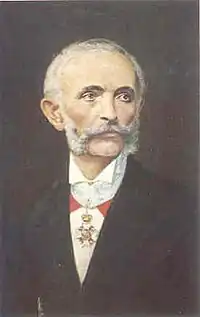Konstantinos Zappas
Konstantinos Zappas (Greek: Κωνσταντίνος Ζάππας; 1814–1892) was a Greek entrepreneur and national benefactor who together with his cousin, Evangelos Zappas, played an essential role in the revival of the Olympic Games.[1][2]

Biography
Zappas was born in 1814 in the village of Labova e Madhe (Mega Lambovo), between Gjirokastër (Argyrokastro) and Tepelenë (modern Albania), then in the Ottoman Empire.[3] He was of Greek[4] or Aromanian descent.[5][6][7][8][9] After the death of Evangelis Zappas, he became the executor of his cousin's legacy and the ongoing revival of the Olympic Games. He was appointed manager of the Olympic Committee that organised the so-called Zappas Olympics, a Greek athletic festival held in 1859, 1870 and 1875 and the forerunner of the modern international Olympics.
In 1881, after the annexation of Thessaly to Greece, he bought extended estates there and the following years contributed to the building of the Zappeion building in Athens, which was officially opened on 28 October 1888. A number of Greek schools and educational facilities were built with his personal financial support including the female schools in Constantinople,[10] in his hometown Labovë, as well as in a number of towns in Epirus (Tepelene, Delvine) and Thessaly. Many students benefited from his scholarship for post-graduate studies in Western Europe (mostly in the scientific field of agriculture).
Zappas died in 1892 in Mantes-la-Jolie, France. After his death, the Romanian government seized all of his assets and capital that were still in Romania causing a noted international law case at that time;[11] his cousin, Evangelis Zappas, was often incorrectly cited as his brother. There was also land and money in Greece that Konstantinos left to the Greek government. Baron Pierre de Coubertin together with A. Mercatis, a close friend of Konstantinos, encouraged the Greek government to put in some of that legacy to fund the 1896 Athens Olympic Games in addition to the legacy of Evangelis Zappas.[12]
The statues of Konstantinos and his cousin Evangelis Zappas are situated in front of the Zappeion.
References
Citations
- Young 1996, p. 109: "...two Greeks, Evangelis and Constantine Zappas..."
- Rühl 2004, pp. 3–16.
- Canner 2007, p. 186 (note 43) citing Vizoukidou 1947, p. 22.
- Sfetas, Spyridon (2003). "Το ιστορικό πλαίσιο των ελληνο-ρουμανικών πολιτικών σχέσεων (1866-1913)". Makedonika (in Greek). Εταιρεια Μακεδονικων Σπουδων. 33: 33.
Όταν το 1892 πέθανε και ο Κωνσταντίνος Ζάππας, η ελληνική πρεσβεία του Βουκουρεστίου διεκδίκησε την ακίνητη περιουσία του,... A family named Zappa, of Greek origin, settled in Romania, amassed a considerable fortune in trade,...
- Pericles Smerlas (1999). About Greece.
Some of the biggest national benefactors and personalities of the Greek history belong to Vlach families, like Pavlos Melas, Evangelos and Konstantinos Zappas, Stefanos and Ion.
- Ioannis Kaphetzopoulos (2000). The struggle for Northern Epirus. Hellenic Army General Staff, Army History Directorate. p. 21. ISBN 9789607897404.
Kolletes and Spyridon Lampros were Vlachs. So were the great national benefactors George Averoff, Nicolaos Stournares, Tositsas, Sinas, Evangelos and Konstantinos Zappas...
- Kahl, Thede (2003). "Aromanians in Greece: Minority or Vlach-speaking Greeks?" (PDF). Jahrbücher für Geschichte und Kultur Südosteuropas. 5: 8.
Indeed, the list of examples of Aromanians in Greek history is quite impressive: [...] Konstantinos Zappas (1814-1892, endowed the Zappeion Hall and the surrounding gardens)
- Jovanovski, Dalibor; Minov, Nikola (2017). "Ioannis Kolettis. The Vlach from the ruling elite of Greece". Balcanica Posnaniensia. Adam Mickiewicz University in Poznań. 24 (1): 222. ISSN 2450-3177. Retrieved 8 May 2017.
Vlachs are to be found among [...] Konstantinos Zappas
- Chatzēphōtēs, Iōannēs M. (2002). Hē kathēmerinē zōē tōn Hellēnōn stēn Tourkokratia (in Greek). p. 167.
Από τους Βλάχους αναδείχθηκαν επιφανείς μορφές του Ελληνισμού όπως: [...] Γ. Αβέρωφ Γ. Αρσάκης, Στέργιος Δούμπας, Ευάγγελος και Κων. Ζάππας, Χρ. Ζαλοκώστας, Γεώργιος και Χρηστάκης.
- Ruches 1967.
- Young 1992, p. 183: "When E. Zappas' cousin, executor, and heir, Konstantinos Zappas died in 1892, the Romanian government froze the Romanian holdings, and there was a celebrated legal uproar."
- Young 1996, p. 117; Martens 1893; Streit 1894.
Sources
- Canner, Efi (2007). "Embourgeoisement, résaux sociaux et identités de genre dans les Balkans (Deuxième moitié du XIXe siècle): Le cas de Sotiria Cléoménous-Alibertis". Turcica. 39: 175–199. doi:10.2143/TURC.39.0.2033061. ISSN 0082-6847.
- Martens, Fedor Fedorovich (1893). Memoire sur le conflit entre la Grece et la Roumanie concernant l'affaire Zappa (in French). Athens.
{{cite book}}: CS1 maint: location missing publisher (link) - Ruches, Pyrrhus J. (1967). Albanian Historical Folksongs, 1716–1943: A Survey of Oral Epic Poetry from Southern Albania, with Original Texts. Chicago, IL: Argonaut Incorporated.
- Rühl, Joachim K. (2004). "Olympic Games Before Coubertin". In Findling, John E.; Pelle, Kimberly D. (eds.). Encyclopedia of the Modern Olympic Movement. Westport, CT: Greenwood Publishing Group. pp. 3–16. ISBN 978-0-313-32278-5.
- Streit, Georges (1894). L'affaire Zappa: Conflit Gréco-Roumain (in French). Paris: L. Larose.
- Vizoukidou, P. K. (1947). Megaloi Evergetai tou Ethnous ek Voreiou Hepeirou – Oi Exadelfoi Zappai (in Greek). Thessalonica: Triantafyllou.
- Young, David C. (1996). The Modern Olympics: A Struggle for Revival. Baltimore, MD: Johns Hopkins University Press. ISBN 0-8018-5374-5.
- Young, David C. (1992). "Greece and the Origins of the Modern Olympic Games". In Coulson, William D. E.; Kyrieleis, Helmut (eds.). Proceedings of an International Symposium on the Olympic Games, 5–9 September 1988. Athens: Deutsches Archäologisches Institut Athen. pp. 175–184. ISBN 9780946897537.